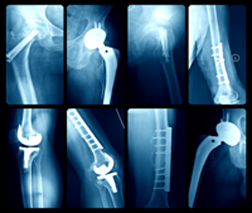 There can be other complications too, according to an exhaustive report in The Atlanta Journal-Constitution (5/11/14). Infections acquired in the hospital setting, together with other complications, can cause an otherwise textbook surgery to go off the rails. Surgeons and hospitals can be held accountable for botched procedures by way of a Knee Replacement lawsuit.
There can be other complications too, according to an exhaustive report in The Atlanta Journal-Constitution (5/11/14). Infections acquired in the hospital setting, together with other complications, can cause an otherwise textbook surgery to go off the rails. Surgeons and hospitals can be held accountable for botched procedures by way of a Knee Replacement lawsuit.But more often than not, litigation surrounding knee replacement problems, and many a Hip Replacement Lawsuit, stem from replacement hip and knee joints that fail prematurely.
When that happens, revision surgery is required to remove the problematic device and replace it with a different model (although the design is usually similar - more on that it a minute). Not only is revision surgery usually more complicated than the initial procedure, it can also take longer to heal and remove the patient for longer periods of time from responsibilities to family and career. Many patients, in their 50s, are still actively engaged in work.
The Atlanta Journal-Constitution referenced a comparison to the pain and frustration inherent with complications following surgery - which includes Hip & Knee Replacement Implant Failure - “that make the patient’s old, arthritic steps feel like a cakewalk.”
It is true that the majority of patients benefit greatly from hip and knee replacement, and enjoy positive outcomes. However, a growing collective of patients, a number increasing exponentially in lockstep with the increase in hip and knee replacements - together with new and trendy implants that are failing prematurely - are having problems.
“All of these risks are relatively uncommon,” says Dr. Kevin Bozic, an orthopedic surgeon who specializes in complex hip and knee replacements at the University of California San Francisco Medical Center, in comments published in The Atlanta Journal-Constitution. “But when you add them all up, they can occur in 4 (percent) to 5 percent of patients who have an elective procedure.”
In purely statistical terms, that’s a fairly significant number. It is why the typical hip replacement lawyer, together with associates in the replacement knee litigation business, is becoming increasingly busy.
Why all this hip & knee replacement implant failure?
If there is such a thing as the Perfect Storm for Hip & Knee Replacement Impact Failure, it is the combination of an aging population, the popularity and availability of joint replacement, the vying for market share amongst device manufacturers bringing new products to market, and the 510(k) clearance loophole maintained by the US Food and Drug Administration (FDA), that excuses manufacturers from rigorous and expensive clinical trials when introducing a device to the market that’s substantially similar to devices already available.
And while there are guidelines, there is also room for subjectivity. Hip and knee replacements, for example, have been around for years with good results. A typical hip and knee replacement is and has been historically associated with a life span of 15 years. New products would be expected to at least equal that service record.
However, it hasn’t happened. And due to the availability of the FDA 510(k) clearance, the problems have surfaced not within clinical trials, but within the general population.
Hip and knee replacement joints were historically fashioned from ceramic, which admittedly had a tendency to become brittle.
Then along comes the manufacturers, with an idea for metal-on-metal joints made from cobalt and chromium alloys. It’s metal - stronger and hardier than ceramic - so what could go wrong? From the FDA 510(k) point of view, a hip or knee replacement is not a new device. The manufacturer is not altering the design, in the FDA’s view - just the materials used.
Thus, metal-on-metal hips and knees escaped the critical clinical trial step, and thus fast-tracked to market.
In 2010, the problems started coming. Minute particles of metal from these uber-promising devices were seen to flake away and become imbedded in surrounding bone and tissue, inflaming the tissue and subjecting patients to a great deal of pain and discomfort. Then there is metallurgic toxicity, when ions from the metal make their way to and through the bloodstream.
READ MORE HIP AND KNEE REPLACEMENT LEGAL NEWS
One patient profiled in The Atlanta Journal-Constitution story has had four procedures done - two knee replacements, followed by two revision surgeries. He’s good now, but the 75-year-old went through hell to get to where he is today. “[Doctors and manufacturers] are happy to tell you about their success stories, but nobody talks about the failure rates,” said Salvatore Cassaro.
One Hip Replacement Lawyer was quoted as saying, “when these things fail, they fail really badly.”
